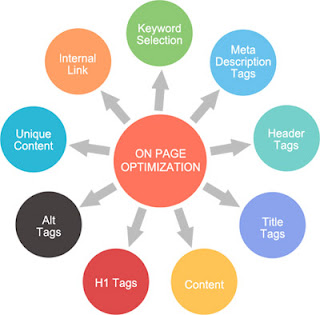SEO Stands for "search engine optimization". It is the process of getting traffic from the "free", "organic", "editorial" or "natural" search results on search engines.
Mainly three process in search engine
1. crawling
2. caching
3. indexing
Crawling
Crawling is a scanning of new webpages.
Caching
In SEO generally refers the process by which search engines crawl your site, make "copies" of what page looked like when they crawled it and then add those copies to their index.
Indexing
It is a database used by a search engine. It contains information on all the websites the search engine was able to find.
OPTIMIZATION TECHNIQUE IN SEO
Off page optimization
It refer to all measures that can be taken outside of the actual website in order to improve it's position in search results.
On page optimization
It refer to all measures that can be taken directly within the website in order to improve it's position in the search results.
It is also called content specific. It based on the number of keyword used in the website. Most number of times the searched keyword exist in which site will shown first. The main problem of niche specific is keyword stuffing
Keyword stuffing is when someone attempts to manipulate their position in the search results by concentrating relevant keywords.
The SEO is two types
1. White hat SEO
It completely follows search engine rules and policies. It refers to the usage of optimization strategies, techniques and tactics that focus on a human audience opposed to search engines.
2. Black hat SEO
It does not obey search engine guidelines. It refers to the use of aggressive SEO strategies, techniques and tactics that focus only on search engine and not a human audience.
The following SEO tactics are considered black hat
a) content automation
b) doorway pages
c) hidden text or links
d) keyword stuffing
e) article spinning
Link specific
It refers to the number of back links that point to a given website. Large number of link containing website shown first.
Quality link specific
Web masters can improve the rank of their sites by increasing the number of high quality sites that link to their pages. High page rank website shown first.
Passing juice
It is also called link juice. It refers to the power or equity passed to a site via links from external or internal sources. It used to be the case that the nofollow attribute could be used to preserve the loss of link juice.
<a href ="www.example.com">example</a>rel ="nofollow"
GOOGLE UPDATIONS
PANDA updation
It is also called farmer updation. Google's panda update is a search filter meant to stop sites with poor quality content from working their way into google's top search results. The following content websites are catching this updation
1. content duplication
2. content plagiarism
3. low quality content
4. spelling mistake
5. no content
6. content spinning
In 2014 panda 4 is update.It added permanent filter on algorithm.the spam sites are stored in a temporary storage place is called sand box
PENGUIN updation
Google penguin update to better catch sites deemed to be spamming it's search results, in particular those doing so by buying links or obtaining them through link networks designed primarily to boost google rankings. The following link contained websites are spammed
1.low quality links
2.link exchange
3.automatic generate links
4.link selling
5.wiki spamming
6.comment spamming
PIRATE update
Google pirate update is a filter to prevent sites with many copyright infringement reports, as filled through google DMCA system, from ranking well in google listings.
EMD update
The Exact Match Domain is a filter to prevent poor quality sites from rankings well simply because they had words that match search terms in their domain names.
HUMMINGBIRD update
It is the first major update to google search algorithm since the 2010 "caffeine update", but even that was limited primarily improving the indexing of information rather than the sorting information.
PIGEON update
The pigeon update is a new algorithm to provide more useful, relevant and accurate local search results that are tied more closely to traditional web search ranking signals.
MOBILEGEDDON update
Google releases mobile friendly ranking algorithm that's designed to give a boost mobile friendly pages in google mobile search results.








